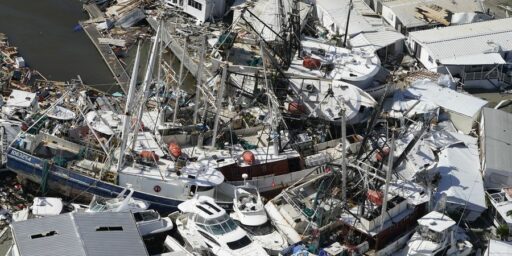Moral Hazard and Disaster Relief
Michael Demmons asks a question that has occured to me from time to time as well:
A tree crashes in my backyard and destroys my home. Unless I am covered by insurance, I am out of luck. A thousand trees crash into hundreds of homes. All of a sudden, it’s a disaster area, and the president walks in with billions in financial aid. Why is that?
It certainly throws the whole moral hazard equation out of whack. Why spend the money for insurance if you’re going to get bailed out by Uncle Sam? It would be one thing to provide relief for a freak flood in Arizona, since it is not something one would rationally plan for. But getting hit by a hurricane in Florida? That’s as rare as snow in North Dakota. (For which, oddly, we provide no relief funds.)
Of course, I’m still trying to figure out why–aside from politics–the taxpayers shelled out thousands of dollars apiece to the non-uniformed victims of 9/11. The families of the stockbrokers who were killed in the Twin Towers are no more aggrieved than any other people whose loved ones were murdered.






Just one of those things to wonder about. There is at least one reason I can see though. In a singular event the local police, fire dept., charities, are available and presumbably unscathed to help you out. In a large scale event they my be unable to respond and help adequately. Still doesn’t explain the additional rebuild funding entirely.
Have you guys ever dealt with an insurance company after something like this? It takes forever to actually get money out of them, and when it comes, it’s never enough. It’s amazing that “replacement value” doesn’t mean the same thing to them as it does to us.
And, right or wrong, there are a whole bunch of folks out there who don’t bother with insurance, period.
I have seen several citations on an appropriate Davy Crockett story. Here is one:
http://www.neusysinc.com/columnarchive/colm0009.html
Is it really a mystery? FEMA funds, as with most government expenditures, usually go to where politicians expect to get the most votes in exchange.
911 was an interesting case because a rich man used stolen property belonging to corporations with deep pockets to attack buildings with wealthy owners. Long term the lawsuits possible in this case should lead to huge judgements. So Congress steped in to short circuit the long process and to try to keep commercial insurance available. In the longer term seized terrorist assets add up, hopefully making whole the federal investment.
MichaelW: That’s a given. We’re just noting the illogic and negative policy impact.
Ripper: Of course, we’d have the seized assets anyway. And Congress could have protected the airlines and so forth from lawsuits outright.
Ideally the lawsuits will judge only against Bin Laden and we’ll seize enough Al Queda assets to pay the judgements. But the outcome of the war and the lawsuits is delayed. For instance Bin Laden has only some of the money required personally, but his rich family is at small but continuing risk of collateral damage from Iranian nukes, U.S. counterforce strike fallout and Al Queda deployed smallpox. If we capture him he will remain alive in custody for some time, but his family will remain at risk and Saudi law could eventually even leave him the sole heir of an empty desert.
Congress choose to cut the Gordian Knot quickly.